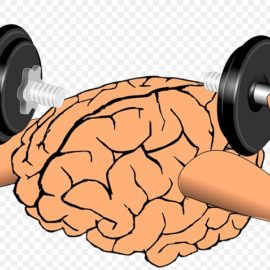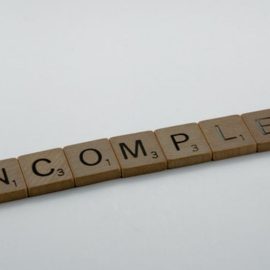

This article is an excerpt from the Shortform book guide to "The Light We Carry" by Michelle Obama. Shortform has the world's best summaries and analyses of books you should be reading.
Like this article? Sign up for a free trial here.
What is Michelle Obama’s book The Light We Carry about? What is the key message to take away from the book?
In her book The Light We Carry, former US First Lady Michelle Obama explains that everyone has the potential to improve the world in a way others can’t since everyone has unique abilities, strengths, and perspectives. Since our potentials are unique, Obama believes we have a responsibility to fulfill them.
Below is a brief overview of The Light We Carry: Overcoming in Uncertain Times by Michelle Obama.
The Light We Carry: Overcoming in Uncertain Times
In her book The Light We Carry, Michelle Obama writes that the best way to live up to your potential to create positive change is to nurture your unique abilities, strengths, and perspectives and share them with the world. Obama implies that these traits form your fundamental core—the “light” referenced in the title. For simplicity’s sake, we’ll refer to these traits as your “personhood” throughout this guide.
Throughout her life, and especially during her tenure as First Lady of the United States, Obama has experienced many kinds of hardship and uncertainty, such as facing racism from the press. Through these experiences, she developed what she calls a “toolbox” of ways to regain her equilibrium and continue to face life with hope and a determination to change the world for the better. Obama described some of these experiences in her first book Becoming, but she wanted to go more into depth about her toolbox in The Light We Carry with the hope that it could help other people create their own.
In this guide, we’ll explore the benefits of and obstacles to nurturing and sharing your personhood. We’ll look at the tools Obama recommends for overcoming these obstacles and the experiences that led her to these conclusions. In our commentary, we’ll compare Obama’s ideas to those of other self-help authors such as Stephen R. Covey, and we’ll see how her suggestions intersect with psychological principles.
The Benefits of Nurturing Personhood
Obama discusses a number of benefits of nurturing your personhood. These are benefits she’s identified in her efforts to nurture and share her personhood with the world. We’ve synthesized this information into three main categories.
Benefit #1: Improving Mental Health
One benefit to nurturing and sharing your personhood with the world is better mental health. To explore why, let’s first consider why not sharing your personhood harms your mental health. It takes a lot of energy to hide or downplay your true self, Obama says. Constantly analyzing and adjusting your behavior to maintain this facade leads to stress and exhaustion.
In contrast, people who share their true selves are happier and have better self-worth, Obama implies. They spend their energy nurturing their personhood rather than downplaying it, and they feel less stress and shame because they don’t feel the need to hide their identity.
Benefit #2: Creating Positive Social Change
Nurturing your unique personhood gives you a sturdier foundation from which to create positive social change. Obama explains that hardship and uncertainty are facts of life, and they often make people feel helpless and prevent them from enacting change. However, you can overcome this sense of helplessness by focusing on your abilities and strengths—elements that contribute to Obama’s definition of personhood. By focusing on what you can do rather than what you can’t, you’ll feel more confident and able to face uncertain and difficult situations.
Obama faced uncertainty and hardship when becoming First Lady, which could’ve stopped her from enacting change. Instead, she used the power of her position to start several initiatives focused on social change.
Benefit #3: Building Community
According to Obama, nurturing and sharing your personhood helps build communities in two ways:
1. People who nurture their personhood are more empathetic, and empathy facilitates community-building. When you spend time recognizing and nurturing your personhood, it becomes easier to recognize other people’s personhood and better understand their perspectives. In turn, this increase in empathy helps you form supportive relationships: It’s easier to see past any differences between you and another person and focus on your common personhood. This increased understanding helps you recognize how the other person can use their skills to support others and identify the areas they need more support with. These supportive relationships are the first step in building a community.
2. When you share your authentic personhood with the world, you encourage others to do so too, which also builds community. Many people don’t share their personhood because they’re afraid no one will understand or relate to them. When you share your authentic self despite this fear, you show them they’re not alone and make authenticity less daunting, helping them overcome their fear.
Now that we’ve discussed the benefits of nurturing and sharing your personhood, we’ll explore the major obstacles to doing so—fear, misunderstanding change, neglecting mental health, and discrimination—as well as Obama’s suggestions for overcoming these obstacles.
Obstacle #1: Fear
Fear is one of the biggest obstacles to nurturing and sharing your unique personhood with the world. Fear stops people from taking action or living up to their potential for positive change. This is because fear is a reaction to the potential of loss, and people don’t want to lose what they already have by striving for something better.
Obama experienced this fear when her husband Barack Obama told her he wanted to run for president. Her husband believed he’d be a wonderful president, but she didn’t want to lose the stable life they’d built in Chicago or risk the entire country disrespecting them. If she hadn’t overcome this fear, it could’ve prevented the Obamas from nurturing and sharing their personhoods and creating change on a national scale.
Work through fear instead of succumbing to it, Obama advises. When you overcome your fears, you increase your competence—your ability to handle difficult situations. This helps you approach the future confidently, knowing you can handle whatever situations might arise. This was the case for Obama, who says she’s more confident in herself and her ability to handle whatever life throws at her after overcoming her fear and agreeing to her husband’s presidential campaign.
Here, we’ve organized Obama’s strategies for working through fear into three steps:
Step #1: Accept Fear
The first step of working through fear is accepting that fear is an inescapable part of life. Fear is impossible to avoid because every person can lose something, whether it’s money, a friend, or even their life. It’s impossible to eradicate fear, and trying to do so will cause frustration and make it difficult to nurture your personhood.
Step #2: Define Fear
The second step of working through fear is defining your fears. This helps you identify which fears are stopping you from taking on new challenges that nurture your personhood. According to Obama, there are two types of fear:
1. Protective fear—which Obama calls rational fear—shields you from real threats. This kind of fear is necessary and helpful. For example, the fear of getting hit by a car keeps us from walking in the street. You should listen to this kind of fear to avoid dangerous situations.
2. Restrictive fear—which Obama calls irrational fear—prevents you from growing and having new, positive experiences. Rather than being helpful, this kind of fear magnifies minor threats until you’re paralyzed. For example, a fear of rejection stops you from having meaningful relationships. You must overcome this kind of fear.
Step #3: Face Restrictive Fears
The final step of working through fear is facing your restrictive fears. Obama explains that defining a fear as restrictive makes it less powerful but doesn’t help you overcome the fear entirely. To do that, you must nurture your personhood by facing your fears. In our example, knowing that thunder is only noise reduces Kelly’s fear, but unless she can leave the house during a storm, the fear still controls her. To overcome her fear, Kelly must go outside when it’s thundering—and going outside will arguably allow her to connect with others, thus nurturing and sharing her personhood.
Obstacle #2: Misunderstanding Change
Another obstacle to nurturing and sharing personhood is misunderstanding change, Obama explains. Many people believe change happens quickly and all at once, only requiring an initial burst of effort to set in motion—much like sledding down a hill only requires a quick push before gravity takes over. However, change is a slow process involving gradual progress, making hard decisions, and compromising. In other words, real change isn’t as easy as sledding down a hill—it’s more like training to be a downhill skier, putting in years of hard work and practice before finally being able to safely and swiftly reach the bottom of the hill.
Obama describes her own experiences with misunderstanding change as occurring in times of great stress, such as the Covid-19 pandemic. These experiences led her to create the strategies for understanding change and nurturing personhood we’ll discuss in this section.
Obstacle #3: Neglecting Mental Health
Another obstacle to nurturing and sharing personhood is our tendency to neglect our mental health. When we do this, we become discouraged and exhausted, making it difficult to nurture our purposes and create positive change.
Often, this tendency to neglect mental health stems from guilt: We believe taking a break means abandoning our cause. This isn’t true, Obama says. Maintaining your mental health is essential to completing goals. The healthier you are, the more energy you can use to meet your goals. This is one of the reasons Obama made it a point to maintain her mental health as First Lady by going on walks, talking to her friends, and getting enough sleep. These activities may have cut into her working time, but they made her more effective.
Obama offers three tips for maintaining your mental health so you can nurture and share your personhood:
Tip #1: Recognize When You’re Struggling
Previously, we discussed how understanding your fear can help you recognize when it’s restrictive. The same tactic can apply to mental health. Reflect on times you’ve been in a healthy place mentally and how you achieved that state, Obama says. This can reveal patterns of behavior that help you feel happy, confident, and in control. After recognizing these patterns, use them to improve your mental health and nurture your personhood. For example, if mindfulness meditation always makes you feel happy and fulfilled, make it a regular part of your schedule.
In addition, Obama explains that the more you reflect on your healthy mental state, the easier it’ll be to recognize when you’re not in that state. This knowledge helps you practice self-care and escape negative spirals. To use a popular metaphor, a frog that’s put in a pot of gradually heated water may not notice it’s being boiled alive. However, if the frog regularly notices the state of the water, comparing it to its past experiences and evaluating how the water makes it feel, the frog can better detect changes in the water and react accordingly.
Tip #2: Prioritize Personhood Over Self-Criticism
Second, Obama suggests prioritizing personhood over self-criticism to maintain your mental health: Focus on recognizing your unique personhood and expressing joy at your existence, rather than focusing on your imperfections. Doing so separates your worth from your appearance, status, or success. It emphasizes that you deserve to be loved and celebrated simply because you’re a unique individual who can’t be replaced. This realization makes you happier and more confident, improving your mental health.
In contrast, Obama notes, focusing on imperfections hurts your self-esteem. It makes you self-conscious, magnifying the flaws in your mind until you can’t recognize your inherent worth.
Tip #3: Create a Support System
Prioritizing personhood over criticism is helpful when following Obama’s next suggestion: creating a support system. We all need support, care, and companionship to remain mentally healthy, Obama says.
It’s specifically important to build a whole system of these relationships, Obama stresses. Many people rely on their spouses to provide the care, companionship, and support they need. While your spouse is an important source of support, forcing them to hold all the responsibility is unfair and could damage both of your mental health by increasing their stress and exhaustion, leaving you unsupported. Having a wide support system spreads this responsibility among many people while also increasing the odds that someone will be available to help you whenever you need support.
Obstacle #4: Discrimination
Discrimination is another obstacle that prevents people from nurturing and sharing their authentic selves with the world. Discrimination occurs when a person is different from the majority in some way and is treated poorly because of those differences. Obama says discrimination makes people self-conscious. She defines self-consciousness as a shift in perspective in which people focus on behaving in a way that’s acceptable to others, instead of behaving in a way that nurtures their personhood and makes them happy and fulfilled.
For instance, Obama faced discrimination during her college years. As one of the only Black and female students at Princeton, she worried constantly about how the rest of the student body saw her, and she struggled to feel happy or fulfilled.
Obama says there are two main types of discrimination that cause this shift in perspective:
Type #1: Lack of Representation
One way discrimination causes minorities to experience self-consciousness is by underrepresenting their identities in many fields. Obama says minorities often struggle to find role models since most industries are dominated by the majority. This lack of role models makes minorities feel isolated and powerless: They have trouble believing they could complete an ambitious goal in their field because they lack examples of how to do so. This disbelief makes it harder for them to challenge themselves and nurture their personhood.
Often, Obama says, a lack of representation makes minorities either give up their goals or suppress parts of their personhood to emulate someone very different from themselves. They behave self-consciously, changing their behavior to fit others’ expectations. For example, if Emma loves science but she’s never learned about important female scientists, she might feel discouraged. She might believe that only men can be scientists. This might make Emma give up on science, or she might believe she has to act like a man to be successful. Thus, Emma becomes self-conscious, either abandoning her interest in science or suppressing her more feminine traits to fit the standards she’s been exposed to.
Type #2: Minimizing Personhood
Discrimination also causes self-consciousness when the majority fixates on minorities’ differences to the point of minimizing their personhood. They focus on how minorities differ from them and overlook those people’s talents, personalities, achievements, and the things they might have in common. Obama implies that this happens because members of the majority value their own personhood and consider their attributes part of said personhood. As such, any departure from these valued attributes is seen as negative and reducing someone’s worth.
Over time, minorities begin to internalize this method of assigning value, Obama warns. They focus on the way they and other minorities differ from the majority, and they’re more likely to value themselves and others less based on these differences.
Obama says encouraging diversity is the key to reducing this kind of discrimination. As members of the majority encounter more minorities, they’ll become more used to the differences people have and start seeing beyond those differences to the minorities’ personhood. Realizing that minorities have equal worth and personhood encourages the majority to realize their worth doesn’t depend on attributes such as ethnicity, gender, or sexuality. Thus, they’ll be less likely to devalue people who don’t share those attributes, reducing discrimination.
Turn Self-Consciousness Into Empowerment
To nurture your personhood in the face of discrimination, Obama says to refocus on doing what makes you feel happy and fulfilled. Shifting your focus empowers you to direct your own life, instead of being controlled by other people’s expectations. It also helps you become comfortable sharing your authentic self because you’re proud of who you are and your achievements.
Obama offers several tips for turning self-consciousness into empowerment, which we’ve organized into three steps:
Step #1: Acceptance
The first step is accepting things you can’t change. This lets you focus on things you can control, helping you nurture your personhood and making it more likely that you’ll improve things. By contrast, focusing on things you can’t change makes you feel powerless and bitter.
For example, let’s say Tom couldn’t buy a particular house because the seller dislikes Black people. Focusing on this discrimination makes Tom feel miserable and powerless, but if he focuses on finding a non-discriminatory seller or reporting this instance of housing discrimination, he’ll feel more in control and hopeful.
Step #2: Gratitude
The second step of turning self-consciousness into empowerment is to focus on what you have, not what you don’t. This can include everything from objects to relationships. Obama says focusing on these positives helps you feel successful and worthwhile. Feeling successful and worthwhile helps combat the discrimination that lowered your sense of self-worth and helps nurture your personhood. For example, Tom can focus on how he feels valuable as a father and husband, rather than focusing on his lack of a house.
Step #3: Reframing Thoughts
Finally, Obama states that people must reframe the way they think about their and other people’s personhood: Specifically, they must combat internalized discrimination by changing their thought patterns. In other words, instead of saying “I’m different and that’s bad” or “Others are different and that’s bad,” people should say “I’m different and that’s good” or “Others are different and that’s good.” Over time, everyone’s thought patterns will become more positive, encouraging themselves and others rather than tearing them down.
Changing your thought patterns is difficult. Obama suggests exploring how your differences are also strengths. The challenges minorities face often make them adapt in ways the majority don’t. This means minorities’ perspectives—and thus their personhood—are unique and help them have innovative ideas. By identifying how their differences are also strengths, minorities can feel empowered and help solve problems.
For example, imagine a programming team is making an app that helps people with autism communicate. If one team member has autism, they can recognize that their experiences provide a valuable window into the communication needs of people with autism. Therefore, they’re well-equipped to design innovative features for the app.

———End of Preview———
Like what you just read? Read the rest of the world's best book summary and analysis of Michelle Obama's "The Light We Carry" at Shortform.
Here's what you'll find in our full The Light We Carry summary:
- Michelle Obama's advice on fulfilling your potential in life
- The benefits of nurturing and sharing your unique abilities and strengths
- How to overcome the obstacles to reaching your potential and creating change






